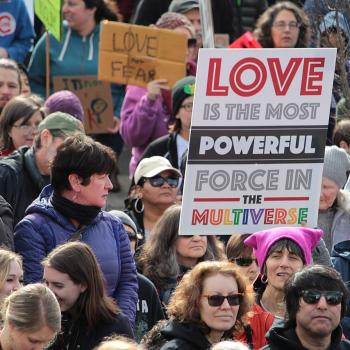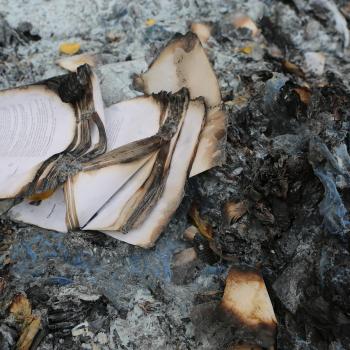Meditation: Confidence and pride, ego and attitude are all manifest themselves in how we present ourselves to the world, and how we understand ourselves in response to lifelong feedback. A painful stripping off of these protective psychological layers reveals our shared vulnerability. No matter how successful one is in the eyes of the world, or how humble, when stripped of our self-trappings, we are each of us exactly alike in our need to be loved, protected, and valued. Pope Benedict has written, "If an individual is to accept himself, someone must say to him: "It is good that you exist" -- must say it, not with words, but with that act of the entire being that we call love." A prolonged experience of unemployment and refusal can make one feel unloved and irrelevant. But it is good that you exist. Others believe this. Christ knows this. You are meant to know it, too.
Fourth Mystery: Carrying the Cross
Prayer: Christ, when you carried the wood to which you would be nailed, it was a long walk no one else could make. Beaten, exhausted, hungry, and thirsty, you trudged along, each step heavy with fatigue. In the heat and dust, your destination seemed to waver, its location uncertain. Weakened, you must have been tempted to give up and let them kill you where you dropped. When Simon of Cyrene was called upon to help you, your burden was lessened, but that only allowed the torturous walk to go on; it was a bittersweet assist. I know something of that. As I find myself depleting reserves I may never be able to rebuild, or having to accept help I would prefer not to need, it is bitter; it feels like a downcasting humiliation. Help me carry my cross as you carried yours, with humble dignity.
Meditation: Humility is a scorned virtue, a cultivated garden our society disdains. Humility is misunderstood as weakness when, in fact, is it the strong foundation upon which dignity and blessings are built. The Messiah washed the feet of his own disciples; he accepted unjust abuse when he could have unleashed retribution. His eventual victory began with acquiescence, with a willingness to become the most vulnerable of all creatures, a human infant. Humility embraced with dignity is a perspective-changer; it brings gratitude, without which there is no room for even the smallest of joys to penetrate, and eventually heal.
Fifth Mystery: Dying on the Cross
Prayer: To be honest, Jesus, remembering your death does not immediately fill me with hope. You died! Planted amid jeering onlookers and gamblers and weeping women, all of your energy spent, you died. That seems hopeless, but because you always invite me to look more closely, I will look at you, crucified, and here I comprehend that everything I am feeling, all of my experiences in this ordeal, have been nailed with you, to the cross. You too were terrified and anxious; you too were abandoned by your friends. You too were publicly shamed, and left to the mercies of weak authority, indifferent bureaucrats, and bullies. You too groaned under the weight of your trouble; you were conscious of familial grief; you were stripped and exposed, and humiliated, too. In your crucifixion, you are with me. I join my suffering to yours. Help me to die to my fear, die to my doubt, die to my own narrow demands, so that through you, with you, in you, I may yet arise, again.
Meditation: Dying to self, to one's own plans, to a worldly ambition, takes great trust. Trust now. Laying your cross upon the cross of Christ, empty your hands; allow your fearful heart to pour itself out before him. Be emptied that you may receive what Christ has for you. In this sort of death, there is only consummation, and therefore a promise of future glory; "I know the plans I have for you," says the Lord, "plans of fullness, not of harm, to give you a future, and a hope." From Christ's death on that awful Friday came, finally, the sweetest of Sundays. Time ended with the tearing of the veil, and the rolling back of the stone. The rest is illusion and catching up. There is nothing to be afraid of.





